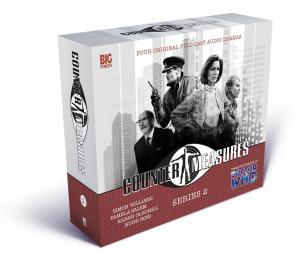Counter-Measures Series 2
Friday, 2 January 2015 - Reviewed by

Manhunt; The Fifth Citadel; Peshka; Sins of the Fathers
Starring: Simon Williams, Pamela Salem, Karen Gledhill, Hugh Ross Written By: Matt Fitton, James Goss, Mark Wright & Cavan Scott, John Dorney
Director: Ken Bentley
Producer David Richardson
Script Editor John Dorney
Executive Producers Jason Haigh-Ellery and Nicholas Briggs
Released June 2013
'Manhunt' sees immediate fulfilment of producer Richardson's promise (in Series 1's extras features) to build on the elements that proved effective and to limit those that detracted. One welcome aspect is that the story employs a 'beginning-in-the-middle' technique, which means a lot of exposition bringing listeners up to speed but also a change of pace that curbs formulaic repetition. The events and the sense of jeopardy are thankfully strong enough to ensure that this information does not feel unwieldy. A very good twist in the final act gives added dimension to the story. Gilmore is fighting to avoid capture and clear his name, and Simon Williams clearly enjoys having to play a quick-witted 'Bond' rift on his usual army-man persona. Allison notably seems to have a chance to make amends for her notably bad romantic life, but decent drama can often spare little regard for such a likeable character.
'The Fifth Citadel' is deliberately slow at first, allowing suspense. Some nice supporting characters help to get the listener involved in the actual plot, whilst there is plenty of intriguing character development for the main four players. Especially effective is the hitherfore uncommon pairing of Toby/Rachel and Gilmore/Allison. The play ultimately comes to full life and meets its potential thanks to the spellbinding Celie Imrie. The ending is suitably memorable and chilling, and also establishes an undertone of paranoia on whether the Counter-Measures team can really believe in each other's integrity.
Next up is 'Peshka' - a quintessentially Cold War story both in themes and in actual plot. To my mind this entry offers the best mixture of the characterisation and morals of this season with the paranormal events/action focus of the previous one. It is made further enjoyable by lots of good dialogue. Much of the personal interaction features heated argument, but impressively the writers avoid the trap of such repetition becoming ever so tiresome. The storyline of a chess genius wishing to defect again is notable in wrong footing the listener, as a decent twist leads to the real source of trouble in the final act. The two main guest stars (Bo Poraj and Emily Tucker) both impress and have put their homework in to sound authentically from their country of origin.
The season finale has its fundamentals from the unresolved details left hanging from 'Manhunt'. More cutting revelations come thick and fast, and manage to be sustained over whole story. The fate of one returning character is surprising in its fashion and when it happens; yet opens up a whole new can of worms. The brittle trust between Knight Kinsella and his Counter-Measures team is pushed to the limit, but could someone else entirely be the one who pushes things too far? One issue I have with a fair number of radio plays is the reliance on sound effects which may be of a confusing nature, and the lack of accompanying narration or explanatory dialogue. 'Sins of the Fathers' perhaps is the most troubled in the set in those terms, but otherwise the production is quite polished. It is also welcome that this really is designed as a direct sequel to the earlier story, as well as continuing the tension from the middle two. Rather predictably, some plot threads are left loose for Series 3 but at the same time the writing team have demonstrated enough flair to raise hopes of there being even more strong material to come.
As stated above, character development and the evolving dynamics of the core group make this series an improvement on the first. The Rachel/Gilmore relationship which was not so fertile in the first series - with other romances cropping up - now seems to be developing into at least a firm friendship if not something deeper altogether. Allison seems to still be learning the hard knocks of life which her older, somewhat embittered colleagues know just a bit all too well. But just as he stole the show in the first run of stories, Hugh Ross' complex character compels again of the main cast, and it now almost feels irrelevant that he never was in the main frame of action in the original television Dalek story. The latter two adventures especially see Sir Toby Kinsella entrusted with power and responsibility but facing awkward questions from his junior colleagues, and the results certainly live up to the strong premise. Further excitement is evoked through the development of the character Templeton. This is a man who clearly has a lot of depth, and a lot of amorality, allowing him to use means to justify end results. Actor Philip Pope is a very good fit for the role, and hopefully will feature again to a notable degree.
Extras are again very comprehensive and entertaining, conveying the sense that the entire cast and crew are working very well together. Anecdotes abound, including how Simon Williams was key in getting his renowned actress-wife Lucy Fleming to participate as Lady Waverly. Similarly Celie Imrie happened to know Hugh Ross before her being invited to return to Doctor Who - after her turn in the bells of St John - which certainly aids their excellent work together in 'The Fifth Citadel'.
The writing team reveal motivations and objectives including: gender politics and their evolution during the 1960s; being able to use tantalising clues for the uncovered interim period between stories/series; and exploring a twist on the Frasier/Niles family dynamic of the beloved American TV show. The latter method is perhaps odd, but ultimately welcome as realistic characterisation makes a decent audio story a good or great one.







